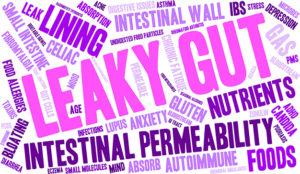 Did you know that most of our health problems start in our gut? The digestive system does much more than just help us to digest and eliminate food. The gut is the home to our microbiome; our own unique collection of gut flora that inhabits our intestines, influences our immunity, mental health, detoxification, and hormones. The lining of our gut is a major protective barrier between the foods we eat, the microorganisms to which we are exposed, and our immune system and its adaptive immune responses. This would include our reactions to foods (if we develop food sensitivities), inflammatory reactions and conditions, and chronic diseases and autoimmune disorders.
Did you know that most of our health problems start in our gut? The digestive system does much more than just help us to digest and eliminate food. The gut is the home to our microbiome; our own unique collection of gut flora that inhabits our intestines, influences our immunity, mental health, detoxification, and hormones. The lining of our gut is a major protective barrier between the foods we eat, the microorganisms to which we are exposed, and our immune system and its adaptive immune responses. This would include our reactions to foods (if we develop food sensitivities), inflammatory reactions and conditions, and chronic diseases and autoimmune disorders.
The protective barrier system within the gut is the lining which is a single row of cells called enterocytes. Between these cells are tight junctions; they are made of protein and act like a glue. Together, the enterocytes and tight junctions’ major job is to regulate what gets across the intestinal lining and into your general system; into the blood. The gut is naturally permeable to nutrients (sugars, amino acids, and fatty acids) and macronutrients (antioxidants, vitamins, minerals) so that you can get your nutrition from your food. However, when your gut barrier and microbiome get weakened from chronic exposure to foods and medications that irritate your gut, or when the good bacteria get out of balance from antibiotics, these tight junctions develop gaps, and you can develop a leaky gut, or leaky gut syndrome (LGS).
When this happens, things that aren’t supposed to get into the blood stream are getting in like fragments of protein and bacteria. Your body recognizes these as foreign invaders and responds with an immune reaction. This immune reaction involves producing antibodies to fight these molecules. Once your gut is “leaky”, your body goes on a sort of “red alert” because it is reacting to many triggers in your gut environment that are leaking into the blood stream.
So how do you know if you have leaky gut? Read the following symptoms and if you identify with more than two, you may want to ask your trusted practitioner about proper testing and treatments.
- You struggle with digestive problems including gas, bloating, constipation, loose stools, or irritable bowel syndrome (IBS).
- You have food intolerances or food sensitivities.
- You suffer from allergies including seasonal allergies.
- You have eczema, skin rashes, acne, or other chronic skin problems.
- You have an autoimmune condition.
- You’re tired all the time.
- You have chronic fatigue syndrome or fibromyalgia.
- You struggle with anxiety, depression, or erratic moods.
- You regularly take NSAIDS (like aspirin or ibuprofen), depression medications, or have been on more than one round of antibiotics.
- You’ve been diagnosed with yeast (Candida) overgrowth or SIBO (small intestinal bacterial overgrowth).
- You can’t lose weight in spite of an excellent diet.
- Your joints ache and swell.
- You have trouble concentrating, with your memory, or notice other cognitive changes.
Healing your gut is not hard to do and it is the most important first step in treating most chronic and inflammatory conditions. Although you may want help from your practitioner or nutritionist, here are some things you can do on your own… and if you follow them you will see positive changes in about 3-6 weeks.
Please know that it can take up to a year to fully heal your gut depending on the severity of your conditions.
Start with an elimination diet for about 3 weeks. Remove all of the triggers that irritate your gut including foods, medications (of course check with your doctor on this), and ideally, stress, too! If you have been diagnosed with Candida (yeast) or SIBO in the past, or have a lot of gas, bloating, and either loose stools or constipation, you might want to do this phase in conjunction with a functional medicine or integrative medicine practitioner who can provide comprehensive stool testing and other lab testing (we do all that here at our Margate clinic) to see if this is still a problem and who can work with you on supplements (or sometimes medications), to eliminate the bacterial overgrowth. The easiest elimination diet to first follow for these 3 weeks is a Paleo diet which eliminates grains, dairy, and legumes.
Next, you may want to add in digestive support if you still notice bloating and gas within the first two weeks. This includes 1 tbs. of apple cider vinegar with mother (Braggs brand) before a meal or digestive enzymes to take with a meal. Ask a practitioner if this should be enzymes with HCL- especially if you have a lot of nausea with meals or when you take supplements.
Many times, leaky gut can be a result of too little good bacteria in the digestive tract. This is where probiotics come into play. Add in a good quality probiotic to restore your gut flora. You want the probiotic to have a minimum of 10 billion CFUs in each dose, and a good range of Lactobacillus and Bifidobacter species- at least 8 strands. Fermented foods such as miso, sauerkraut, kombucha, kefir milk, beet kvass, and kimchee can also be helpful. But please note: we recommend that you follow an elimination diet for at least 1-2 weeks before adding in the probiotic; that way other digestive issues are easier to pinpoint and solve. You want to establish a decent environment before adding additional inhabitants to thrive!
Repairing the gut lining with food alone doesn’t always happen. The following supplements can be taken for up to 6 months to help to heal the intestinal lining:
- Turmeric, aloe vera, marshmallow root, and DGL licorice: (aloe and licorice are not for internal use during pregnancy; these are fine for children) are some of the most effective foods and herbs for healing the gut lining. They are best taken in capsule or extract form, and turmeric can also be added to many foods. DGL licorice is available as chewable lozenges- easiest and simplest form, especially for kids.
- Zinc: 5-10 mg/day for children 4-7 years, 10-20 mg/day for children to age 12, 25-40 mg/day for older children and adults
- An antioxidant supplement containing vitamins A and carotenoids, C, E, and selenium. These are often found in a multivitamin formula however, you can buy them as their own formula as well. Pregnant women should get these from their prenatal vitamin only.
- Fish Oil Supplement: A good quality fish oil or cod liver supplement for adults. For kids, Nordic Naturals has great options. Fish oil is important for general health in pregnancy and breastfeeding, too. Repairing your gut is crucial to your health. Not only will you positive physical changes in your body, but you will notice your mood will be lighter, your sleep deeper, and your energy will increase.
Acupuncture can help repair a leaky gut especially if you are getting treatment in conjunction with diet and lifestyle changes and proper supplementation. Learn how acupuncture works on the digestive system.
If you believe you may have leaky gut syndrome give us a call to schedule a free consultation with Dr. Robert Herbst. Our team of acupuncturists and nutritionists have helped many of our patients rebalance their digestive system and eliminate symptoms associated with this condition.
 Amy Carlson is a Holistic Nutritionist who practices a whole-foods based approach in helping the body to heal and thrive. She has a strong interest in sharing what she has learned so that everyone has the opportunity to live in a healthy body. “Each body has the ability to heal if it is given what it needs and the understanding of why it is hurting is discovered and nurtured as well.” Learn more about her approach to wellness by visiting her website. She works with many of the patients at our clinic via Skype.
Amy Carlson is a Holistic Nutritionist who practices a whole-foods based approach in helping the body to heal and thrive. She has a strong interest in sharing what she has learned so that everyone has the opportunity to live in a healthy body. “Each body has the ability to heal if it is given what it needs and the understanding of why it is hurting is discovered and nurtured as well.” Learn more about her approach to wellness by visiting her website. She works with many of the patients at our clinic via Skype.
